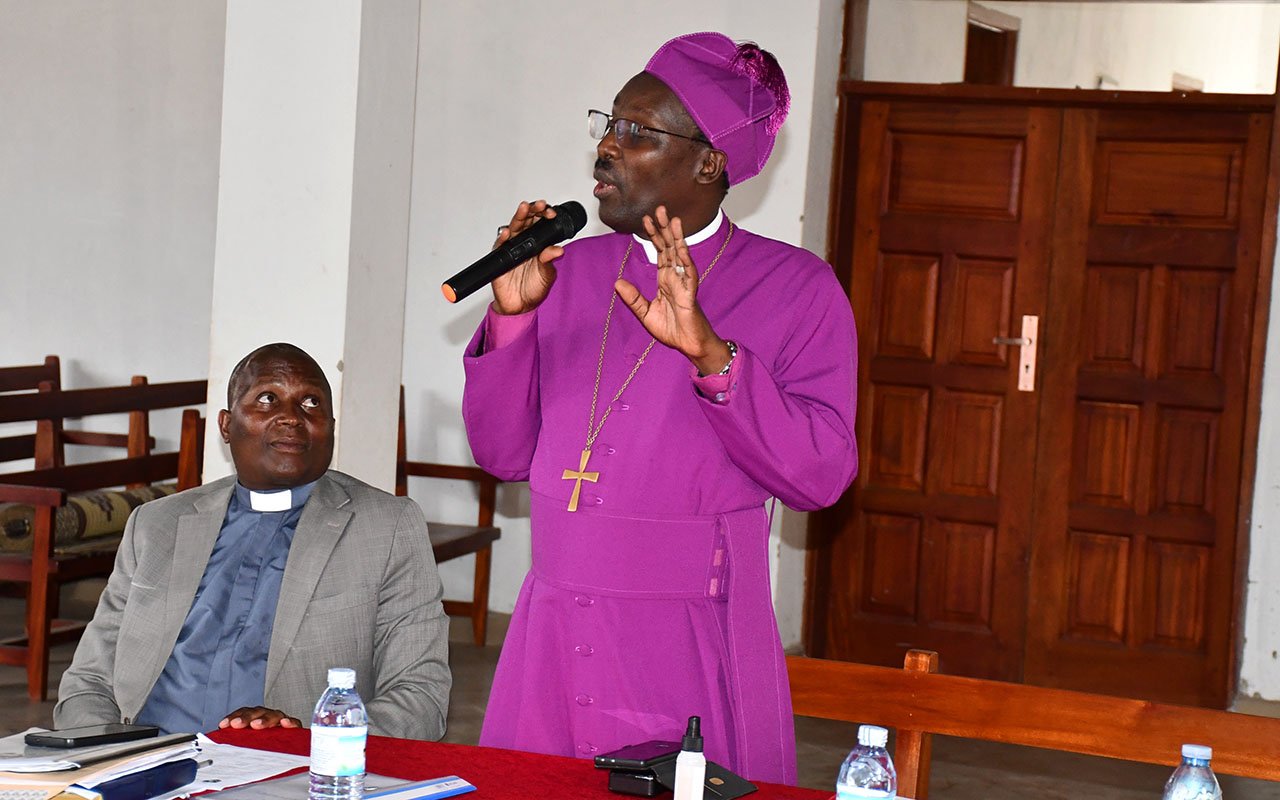Use church land to minimise the cost of education - Ankole Bishop

Bishop Sheldon Mwesigwa talking to school administrators in Ankole diocese on April 8, 2024. PHOTO/RAJAB MUKOMBOZI
What you need to know:
- During the meeting, the headmistress Kinoni Secondary School, Ms Grace Ndagire Tweheyo, revealed how she managed to offset a Shs510 million loan she inherited when she joined the school in 2022 using projects she came out with on church land.
The Bishop of Ankole diocese Rt Rev Fred Sheldon Mwesigwa has told school managers of church founded schools in the diocese to use church land to start income generating projects.
The Bishop who was on April 9 meeting education stakeholders in the diocese who included principals of tertiary institutions, head teachers, members of Parents Teachers Associations (PTA), Boards of Governors (BOG) and bursars at the diocesan headquarters in Ruharo, Mbarara City said depending on parents most of whom remain under social-economic challenges to run schools is not sustainable.
He noted that most of the church founded schools have land on which they can start projects, earn money and support education service delivery rather than depending on school fees.
“We have schools that are doing better, are paying less fees as low as Shs350, 000, their enrolment is high. The trick has been that the administration of these schools have been using our church lands to come up with income generating projects like banana plantations, maize and vegetable growing,” Bishop Mwesigwa.
He said this initiative will help to bridge the gap between the rich and poor in accessing universal education.
The Bishop blamed some schools that instead of using church land for production and cutting on the costs of operation, they are mortgaging land in banks to get loans.
“They are some schools that mortgaged our land to get loans from banks. We were at the verge of losing these lands for unpaid loans. We have cleared some of the loans while others are still pending. We have warned the school administrators that we are custodians of this land and whoever attempts to mortgage it in banks will face dire consequences,” he warned.
The Diocesan Education Secretary, Rev Canon Agasha Muhwezi, said that schools have been directed to start income projects on church land such as tree planting, dairy farming, poultry, piggery and banana plantations so as to subsidise on the cost of education.
“With these projects, when there are financial challenges the school can survive on its own even without school fees like during covid-19. We have good testimonies of schools that are doing wonderfully great in terms of performance, their enrolments are high because of engaging in production,” he said.
He identified some of the schools like Katanoga Secondary School, Kinoni Girls Secondary School, Kashaka Girls High School, Kigaragara high school which he said are performing better because of coming up with interventions to minimise the cost of education.
He said all school managers including PTA and board of governors should help schools engage in projects, support parents to educate their children and reduce school dropouts.
During the meeting, the headmistress Kinoni Secondary School, Ms Grace Ndagire Tweheyo, revealed how she managed to offset a Shs510 million loan she inherited when she joined the school in 2022 using projects she came out with on church land.
“When I was appointed as a head teacher at this school I felt like, let me remain as a traditional teacher because the school was indebted heavily. It had a loan of Shs 510 million but I thought I had to be innovative, and one of the means was to use the church land to come out with projects like banana plantation, vegetable growing which partly helped me to offshoot that loan,” she said.
Mr Taremwa Akankwtasa, a retired educationist, said that the bishop's message is timely especially at a time when the cost of education is becoming a challenge to many Ugandans.
"Efforts by the government to regulate the cost of education, especially on school fees has remained a challenge and such interventions can help the poor-average Ugandan to access education," he said.




